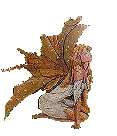 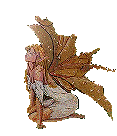 Writers
for centuries have given us poetry about the fae. From Keats the Shakespeare
to modern writers. the variety is as near endless as there are kinds of
Fairies. I've collected some of the best and most famous here for you to
enjoy. Writers
for centuries have given us poetry about the fae. From Keats the Shakespeare
to modern writers. the variety is as near endless as there are kinds of
Fairies. I've collected some of the best and most famous here for you to
enjoy.
|


The Land of Heart's
Desire
William Butler Yeats
The land of faery
Where nobody gets old and
godly and grave,
Where nobody gets old and
crafty and wise,
Where nobody gets old and
bitter of tongue....
Land of Heart's Desire,
Where beauty has no ebb, decay
no flood,
But joy is wisdom, Time
an endless song.
|
|
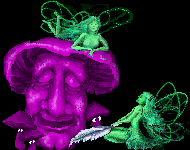
|

The Fairies,
William Allingham
UP the airy mountain,
Down the rushy glen,
We daren't go a-hunting
For fear of little men;
Wee folk, good folk,
Trooping all together;
Green jacket, red cap,
And white owl's feather!
Down along the rocky shore
Some make their home,
They live on crispy pancakes
Of yellow tide-foam;
Some in the reeds
Of the black mountain lake,
With frogs for their watch-dogs,
All night awake.
High on the hill-top
The old King sits;
He is now so old and gray
He 's nigh lost his wits.
With a bridge of white mist
Columbkill he crosses,
On his stately journeys
From Slieveleague to Rosses;
Or going up with music
On cold starry nights
To sup with the Queen
Of the gay Northern Lights.
They stole little Bridget
For seven years long;
When she came down again
Her friends were all gone.
They took her lightly back,
Between the night and morrow,
They thought that she was
fast asleep,
But she was dead with sorrow.
They have kept her ever since
Deep within the lake,
On a bed of flag-leaves,
Watching till she wake.
By the craggy hill-side,
Through the mosses bare,
They have planted thorn-trees
For pleasure here and there.
If any man so daring
As dig them up in spite,
He shall find their sharpest
thorns
In his bed at night.
Up the airy mountain,
Down the rushy glen,
We daren't go a-hunting
For fear of little men;
Wee folk, good folk,
Trooping all together;
Green jacket, red cap,
And white owl's feather!
|
|

Stolen Child
William Butler Yeats
WHERE dips the rocky highland
Of Sleuth Wood in the lake,
There lies a leafy island
Where flapping herons wake
The drowsy water-rats;
There we've hid our faery
vats,
Full of berries
And of reddest stolen chetries.
Come away, O human child!
To the waters and the wild
With a faery, hand in hand,
For the world's morefull of
weeping than you
can understand.
Where the wave of moonlight
glosses
The dim grey sands with light,
Far off by furthest Rosses
We foot it all the night,
Weaving olden dances,
Mingling hands and mingling
glances
Till the moon has taken flight;
To and fro we leap
And chase the frothy bubbles,
While the world is full of
troubles
And is anxious in its sleep.
Come away, O human child!
To the waters and the wild
With a faery, hand in hand,
For the world's morefully
of weeping than you
can understand.
Where the wandering water gushes
From the hills above Glen-Car,.
In pools among the rushes
That scarce could bathe a
star,
We seek for slumbering trout
And whispering in their ears
Give them unquiet dreams;
Leaning softly out
From ferns that drop their
tears
Over the young streams.
Come away, O human child!
To to waters and the wild
With a faery, hand in hand,
For to world's morefully of
weeping than you
can understand.
Away with us he's going,
The solemn-eyed:
He'll hear no more the lowing
Of the calves on the warm
hillside
Or the kettle on the hob
Sing peace into his breast,
Or see the brown mice bob
Round and round the oatmeal-chest.
For be comes, the human child,
To the waters and the wild
With a faery, hand in hand,
from a world more full of
weeping than you.
|
|
|
|

Queen Mab Speech,
William Shakespeare
Mercutio: O, then I see Queen
Mab hath been with
She is the fairies' midwife,
and she comes
In shape no bigger than an
agate stone
On the forefinger of an alderman,
Over men's noses as they lie
asleep;
Her wagon spokes made of long
spinners' legs,
The cover of the wings of
grasshoppers,
Her traces of the smallest
spider web,
Her collars of the moonshine's
wat'ry beams,
Her whip of cricket's bone,
the lash of philome,
Her wagoner a small grey-coated
gnat
Not half so big as a round
little worm
Prick'd from the lazy finger
of a maid;
is an empty hazel nut,
Made by the joiner squirrel
or old grub,
Time out a mind the fairies'
coachmakers.
And in this state she gallops
night by night
Through lovers' brains and
then they dream of love,
On courtiers' knees that dream
on cursies straight,
O'er lawyers' fingers who
straight dream on fees,
O'er ladies' lips who straight
on kisses dream,
Which oft the angry Mab with
blisters plagues
Because their breaths with
sweetmeats tainted are.
Sometime she gallops o'er
a courtier's nose
And then dreams he of smelling
out a suit,
And sometime comes she with
a tithe-pig's tail
Tickling a.parson's nose as
'a lies asleep--
Then he dreams of another
benefice.
Sometime she driveth o'er
a soldier's neck
And then dreams he of cutting
foreign throats,
Of healths five fadom deep;
and then anon
And being thus frighted swears
a prayer or two
And sleeps again. This is
that very Mab
That plats the manes of horses
in the night
And bakes the elflocks in
foul sluttish hairs
Which once entangled much
misfortune bodes.
This is the hag, when maids
lie on their backs,
That presses them and learns
them first to bear,
Making them women of good
carriage.
This is she-
Romeo: Peace, peace, Mercutio,
peace! Thou talk'st of nothing.
Mercutio:. True, I talk of
dreams, which are the children of an idle brain....
Act 1 scene 4 Romeo and Juliet |
|

Oberon's Speech
William Shakespeare
| OBERON
I pray thee, give it me.
I know a bank where the wild
thyme blows,
Where oxlips and the nodding
violet grows,
Quite over-canopied with luscious
woodbine,
With sweet musk-roses and
with eglantine:
There sleeps Titania sometime
of the night,
Lull'd in these flowers with
dances and delight;
And there the snake throws
her enamell'd skin,
Weed wide enough to wrap a
fairy in:
And with the juice of this
I'll streak her eyes,
And make her full of hateful
fantasies.
Take thou some of it, and
seek through this grove:
A sweet Athenian lady is in
love
With a disdainful youth: anoint
his eyes;
But do it when the next thing
he espies
May be the lady: thou shalt
know the man
By the Athenian garments he
hath on.
Effect it with some care,
that he may prove
More fond on her than she
upon her love:
And look thou meet me ere
the first cock crow.
PUCK
Fear not, my lord, your servant
shall do so.
Act 2, Scene 1 A midsummer's
night dream |
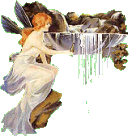
|

Puck and the Fairy
William Shakespeare
| Enter, from opposite sides,
a Fairy, and PUCK
PUCK
How now, spirit! whither wander
you?
Fairy
Over hill, over dale,
Thorough bush, thorough brier,
Over park, over pale,
Thorough flood, thorough fire,
I do wander everywhere,
Swifter than the moon's sphere;
And I serve the fairy queen,
To dew her orbs upon the green.
The cowslips tall her pensioners
be:
In their gold coats spots
you see;
Those be rubies, fairy favours,
In those freckles live their
savours:
I must go seek some dewdrops
here
And hang a pearl in every
cowslip's ear.
Farewell, thou lob of spirits;
I'll be gone:
Our queen and all our elves
come here anon.
PUCK
The king doth keep his revels
here to-night:
Take heed the queen come not
within his sight;
For Oberon is passing fell
and wrath,
Because that she as her attendant
hath
A lovely boy, stolen from
an Indian king;
She never had so sweet a changeling;
And jealous Oberon would have
the child
Knight of his train, to trace
the forests wild;
But she perforce withholds
the loved boy,
Crowns him with flowers and
makes him all her joy:
And now they never meet in
grove or green,
By fountain clear, or spangled
starlight sheen,
But, they do square, that
all their elves for fear
Creep into acorn-cups and
hide them there.
Fairy
Either I mistake your shape
and making quite,
Or else you are that shrewd
and knavish sprite
Call'd Robin Goodfellow: are
not you he
That frights the maidens of
the villagery;
Skim milk, and sometimes labour
in the quern
And bootless make the breathless
housewife churn;
And sometime make the drink
to bear no barm;
Mislead night-wanderers, laughing
at their harm?
Those that Hobgoblin call
you and sweet Puck,
You do their work, and they
shall have good luck:
Are not you he?
PUCK
Thou speak'st aright;
I am that merry wanderer of
the night.
I jest to Oberon and make
him smile
When I a fat and bean-fed
horse beguile,
Neighing in likeness of a
filly foal:
And sometime lurk I in a gossip's
bowl,
; In very likeness of a roasted
crab,
And when she drinks, against
her lips I bob
And on her wither'd dewlap
pour the ale.
The wisest aunt, telling the
saddest tale,
Sometime for three-foot stool
mistaketh me;
Then slip I from her bum,
down topples she,
And 'tailor' cries, and falls
into a cough;
And then the whole quire hold
their hips and laugh,
And waxen in their mirth and
neeze and swear
A merrier hour was never wasted
there.
But, room, fairy! here comes
Oberon.
Fairy
And here my mistress. Would
that he were gone!
Act 2, Scene 1 A midsummer's
night dream |
|

from Paradise Lost
John Milton
Faery Elves, Whose midnight
revels by a forest-side,
or a fountain, some belated
peasant sees,
or dreams he sees, while overhead
the Moon
Sits arbitress and nearer
to the Earth
Wheels her pale course, they
on their mirth and dance
Intent, with jocund music
charm his ear:
at once with joy and fear
his heart rebounds. |
|
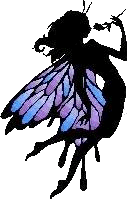 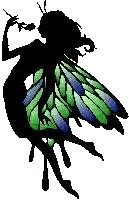
|
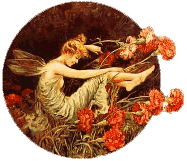
|

I'd Love To Be A Fairy's
Child
Robert Graves
Children born of fairy
stock
Never need for shirt or frock,
Never want for food or fire,
Always get their hearts desire:
Jingle pockets full of gold,
Marry when they're seven years
old.
Every fairy child may keep
Two ponies and ten sheep;
All have houses, each his
own,
Built of brick or granite
stone;
They live on cherries, they
run wild--
I'd love to be a Fairy's child.
|
|

The Fairies Dance
adopted from "Irish National
Poetry"
The fairies dance by brake
and bow'r,
For this to them is the gayest
hour.
With steps so soft and with
robes so white,
They trip it there in clear
moonlight.
Their queen has youth and beauty
rare,
The maids of earth are not
half so fair.
Her glance so quick and her
eyes so bright,
They shine with soft unearthly
light.
She'll meet thee like a lady
fair.
Go not, for danger awaits
thee there!
She'll lead thee far over
grove and glen,
And thou shall ne'er be seen
again.
|
|
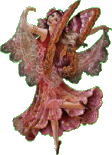
|

Fairy Song
Thomas Haynes Bayly
Oh, where do fairies hide
their heads
When snow lies on the hills
When frost has spoil'd their
mossy beds
And crystalized their rills?
Beneath the moon they cannot
trip
In circles o're the plain,
And drafts of dew they cannot
sip
Till green leaves come again
Till green leaves come again.
Perhaps in small blue diving
bells
They plunge beneath the waves,
Inhabiting the wreathed shells
That liein coral caves
Perhaps in red Vesuvius Carousals
they maintain
And cheer their little spirits
up
Till green leaves come again
Till green leaves come again.
When back they come there'll
be glad mirth
And music in the air,
And fairy wings upon the earth,
And mischief everywhere
The maids, to keep the elves
aloof,
will bar the doors in vain,
No keyhole will be fairy proof
When green leaves come again
Till green leaves come again.
|
|

The Fairies
Rose Fyleman
There are fairies at the
bottom of our garden!
It's not so very, very far
away;
You pass the gardner's shed
and you just keep straight ahead--
I do so hope they've really
come to stay.
There's a little wood, with
moss in it and beetles,
And a little stream that quietly
runs through;
You wouldn't think they'd
dare to come merrymaking there--
Well, they do.
There are fairies at the bottom
of our garden!
They oftenhave a dance there
on summer nights;
The butterflies and bees make
a lovely breeze,
And the rabbits stand about
to hold the lights.
Did you know that they could
sit upon the moonbeams
And pick a little star to
make a fan,
And dance away up there in
the middle of the air?
Well, they can.
There are fairies at the bottom
of our garden!
You cannot think how beautiful
they are;
They all stand up and sing
when the Fairy Queen and King
Come gently floating down
upon their car.
The King is very proud and
very handsom;
The Queen--now you can quess
who that could be?
(She's a little girl all day,
but at night she steals away)
Well, it's me!
|
|

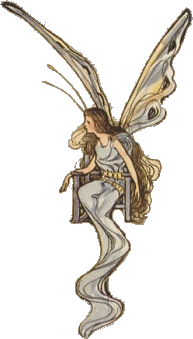
|

If You See A Fairy Ring.
Author Unknown
If you see a fairy ring
In a field of grass,
Very lightly step around,
Tip-Toe as you pass,
Last night Fairies frolicked
there
And they're sleeping somewhere
near.
If you see a tiny fairy
Lying fast asleep
Shut your eyes
And run away,
Do not stay to peek!
Do not tell
Or you'll break a fairy spell
|
|

The Fairy Beam Upon You.
Ben Johnson
The fairy beam upon you,
The stars to glisten on you,
A moon of light
In the noon of night,
Till the firedrake hath o'er-gone
you.
The wheel of fortune guide
you,
The boy with the bow beside
you
Run aye in the way
Till the bird of day
And the luckier lote betide
you.
|
|
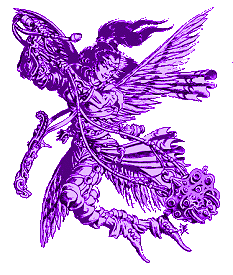
|
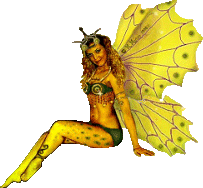
|

THE FAIRY
William Blake
Come hither my sparrows
My little arrows
If a tear or a smile
Will a man beguile
If an amorous delay
Clouds a sunshiny day
If the step of a foot
Smites the heart to its root
Tis the marriage ring
Makes each fairy a king
So a fairy sung
From the leaves I sprung
He leapd from the spray
To flee away
But in my hat caught
He soon shall be taught
Let him laugh let him cry
He's my butterfly
For I've pulld out the Sting
Of the marriage ring.
|
|

Ode to a Nightingale
John Keats
Away! away! for I will
fly to thee,
Not charioted by Bacchus and
his pards,
But on the viewless wings
of Poesy,
Though the dull brain perplexes
and retards:
Already with thee! tender
is the night,
And haply the Queen-Moon is
on her throne,
Cluster'd around by all her
starry Fays;
But here there is no light,
Save what from heaven is with
the breezes blown,
Through verdurous glooms and
winding mossy ways.
|
|
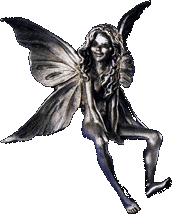
|
| |
|
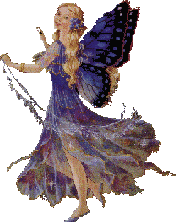
|

Fairy Bread
Robert Louis Stevenson
Come up here, O dusty
feet!
Here is fairy ready to eat.
Here in my retiring room,
Children, you may dine
On the golden smell of broom
And the shade of pine;
And when you have eaten well,
Fairy stories hear and tell.
|
|

Little Elfman
John Kendrick Bangs
I met a little elfman
once,
Down where the lilies blow.
I asked him why he was so
small,
And why he did't grow.
He slightly frowned, and with
his eye
He lookes me through and through-
"I'm just as big for me" said
he,
"As you are big for you!"
|
|
  
|
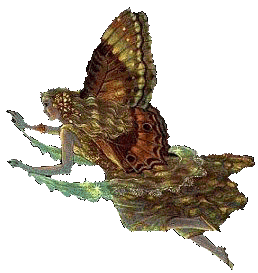
|

By the Moon We Sport and
Play
John Lyly
By the moon we sport and
play,
With the night begins our
day,
As we dance the dew doth fall:
Trip it, little urchins all!
Two by two, and three by three,
And about go we, and about
go we!
|
|

Fairy Frilly
Florence Hoaston
Fairy Frilly for half
an hour
Went to sleep in a poppy flower-
Went to sleep in her little
green frock,
And the time of the ball was
ten o' clock.
Quarter to ten and five to
ten
Ticked from the dandelion
clock again,
But Fairy Frilly was deaf
to all,
And ten was the time of the
fairy ball!
Little West Wind came by that
way,
And he pulled off the petal
where Frilly lay
Pulled it off with the fairy
on it,
And blew with a great big
breath upon it.
Of sailed the petal, Frilly
and all-
And thats how she managed
to get to the ball
|
|
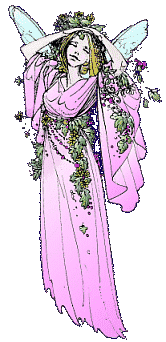
|
|
|

The Light-Hearted Fairy
Author Unknown
Oh, who is so merry, so
merry heigh ho!
As the light-hearted fairy?
heigh ho, Heigh ho!
He dances and sings
To the sound of his wings
With a hey and a heigh and
a ho!
Oh, who is so merry, so airy,
heigh ho!
As the light-headed fairy?
heigh ho, Heigh ho!
His nectar he sips
From the primrose's' lips
With a hey and a heigh and
a ho!
Oh, who is so merry, so merry,
heigh ho!
As the light-footed fairy?
heigh ho!
Heigh ho!
The night in his noon
And his sun is the moon
With a hey and a heigh and
a ho!
|
|

The Find
Francis Ledwidge
I took a reed and blew
a tune,
And sweet it was and very
clear
To be about a little thing
That only few hold dear.
Three times the cuckoo named
himself,
But nothing heard him on the
hill,
Where I was piping like an
elf;
The air was very still.
"Twas all about a little thing
I made a mystery of sound;
I found it in a fairy ring
Upon a fairy mound.
|
|
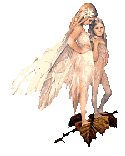
|
 
 
|

Fairy-Land
Edgar Allan Poe
Dim vales- and shadowy
floods-
And cloudy-looking woods,
Whose forms we can't discover
For the tears that drip all
over!
Huge moons there wax and wane-
Again- again- again-
Every moment of the night-
Forever changing places-
And they put out the star-light
With the breath from their
pale faces.
About twelve by the moon-dial,
One more filmy than the rest
(A kind which, upon trial,
They have found to be the
best)
Comes down- still down- and
down,
With its centre on the crown
Of a mountain's eminence,
While its wide circumference
In easy drapery falls
Over hamlets, over halls,
Wherever they may be-
O'er the strange woods- o'er
the sea-
Over spirits on the wing-
Over every drowsy thing-
And buries them up quite
In a labyrinth of light-
And then, how deep!- O, deep!
Is the passion of their sleep.
In the morning they arise,
And their moony covering
Is soaring in the skies,
With the tempests as they
toss,
Like- almost anything-
Or a yellow Albatross.
They use that moon no more
For the same end as before-
Videlicet, a tent-
Which I think extravagant:
Its atomies, however,
Into a shower dissever,
Of which those butterflies
Of Earth, who seek the skies,
And so come down again,
(Never-contented things!)
Have brought a specimen
Upon their quivering wings.
|
|
|
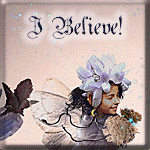

You are visitor number
To this page

The Music on this page is
"The memory of Trees" by Eyna


|